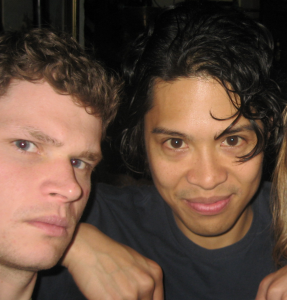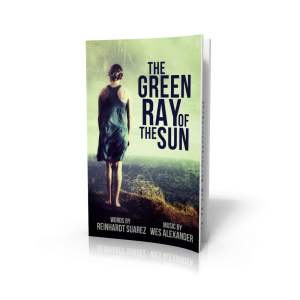Get to know the staff at Gothic Funk Press! Reinhardt Suarez joined the Gothic Funk Nation in 2007 and the Gothic Funk Press in 2011. He has agreed to talk with us this month about his work with Gothic Funk, the Porkchop Express, and his new novel The Green Ray of the Sun.
Gothic Funk Press: So who is Reinhardt Suarez, the man and the artist?
Reinhardt: An enigma wrapped in bacon and seared to a succulent pink color. Nah, really, Reinhardt Suarez is a schmo with a website and now with a book. He is also an editor, writer, teacher, and part-time rockstar. Emphasis on the part-time.
GFP: When I met you at New School, one of the first things that I noticed was that your writing was both weird and playful. I think you’ve perfectly illustrated that here.
Reinhardt: Cool.
GFP: What is, in the broadest sense possible, the arc of your career — particularly as a writer and rock-star — since you launched yourself into the ether?
Reinhardt: I guess I had a strange arc. Before grad school I was already working in publishing, albeit educational publishing. I learned both the editorial and production sides from a multimedia angle — skills that I still use today. When I went to the New School’s MFA program, it really shocked me how little writers — even seasoned ones — knew about the industry of writing. The most knowledgeable of my instructors was David Levithan, he being an editorial head at Scholastic. But stuff like working with others, meeting writers halfway, those sorts of collegial things? Lost on most students. It’s not their fault. MFA programs seem to have this inherent competitiveness that overshadows what could be fruitful working relationships.
So I gained some chops in grad school, but it wasn’t until the end that I decided that I liked writing for young adults. I set upon that right away, but, of course, earning money became paramount to combat hunger and merciless government student loan collectors.
That’s when I sort of delved back into editing more while trying to give myself some sort of creative out. In Chicago one more, we helped create Tuesday Funk, which has only gotten more awesome in others’ hands. And continued to write. But it wasn’t until going to Europe with Wes Alexander and indulging in my musical side (read: karaoke good times) that I felt I had tapped into the core of my creativity. I guess I found that I needed a conspirator of sorts to help challenge me and keep me honest.
I think that the arc now is on a good, steady upward trend. As multimedia misfits, Wes and I carry on as The Pork Chop Express, hopefully creating unique content delivered uniquely as well. I hope that we can only grow as hybrid artists.
I also hope that as we grow, we can work with awesome orgs like Gothic Funk Press in more direct ways. That would be the best of all worlds.
GFP: I think it is interesting — and at this point, too consistent to be coincidental — that most of the staff at GFP have gravitated towards collaboration and multi-media work.
Reinhardt: I think that we’re all kind of caught up in a dramatic zeitgeist shift in media. Not only the content, but the medium itself, of creativity.
GFP: The way that you describe it almost takes on a quest-like aspect. I remember your stories about meeting up with strangers and hearing strange music in the Pyrenees when you were in Europe. I can see how that would be a game-changer, in terms of a sense of artistic mission.
Reinhardt: Yes, I think that is true about travel, but it is also about seeing the cool nooks and crannies in your own hometown. There are so many oddities in this world that we just ignore because we’re busy with other things.
GFP: At the risk of asking a leading question, do you think that this intermedial approach to content-creation and ones audience is more a feature of “experimental” art today than, say, narrative or linguistic play?
That is, is the collaborative while DIY aesthetic today’s “experimentalism”?
Reinhardt: I don’t think that it’s exclusively “experimental.” More of an equalizer, perhaps, in that multimedia gives harder content an easier way for users to ascertain it. For example, a Phillip K. Dick story might get more traction as a fan-made movie on YouTube than in its native textual form. Perhaps if Dick was writing in the modern times, he would have preferred that.
Multimedia can be experimental, though, in ways that we haven’t even delved into yet, I believe.

GFP: So going back, briefly, to New School, I remember that there were fewer experimental or avant-garde writers than than I had expect, even if we define these things very broadly. You had two stories that I remember vividly. One was about a hockey-player confronting his lost love while Godzilla ravaged Tokyo. The other was about characters inspired by Curious George getting caught in an act of terrorism. Your more recent young adult writing is a bit easier to follow, but it still has that sense of underlying play and… restrained anarchy, maybe?
Do you have a unifying aesthetic to all the work you do (on your own or with Wes)?
Reinhardt: I forgot about the Godzilla part of that story! That’s awesome! I gotta use that sometime. I think that I’ve determined that my own unifying aesthetic is voice. Most things I write generally read like I wrote them, which is a good and bad thing. Good, in that I have a voice, bad that it is discernable enough to be difficult to mask. Content wise, I think that I tend toward larger existential questions like the ones I face in life: How do we be good people? What is good? Can I find purpose in this chaos? Y’know, the questions V’Ger is asking in Star Trek: The Motion Picture. I think with Wes in music, there is a sense of synergy in how we think because we’re in similar places. I mean in life (he’s in Chicago, and I’m in Minneapolis).
Generally, I’d like everything I write or do to have playfulness in it.
GFP: I think that playfulness comes so naturally to you that it would be painful, if it was even possible, for you to write it out.
Reinhardt: I don’t think it’s possible. I’ve tried.
Again, a good and bad thing. I’ll never be Jonathan Franzen. Le sigh.
GFP: Tell me a bit more about Porkchop Express because it is a strange, tentacled entity of sorts. Your friends have described it as a collaboration, as a blog, as a band, as a band of gypsies (okay, that last was Jimi Hendrix). What is the Porkchop Express?
Reinhardt: Well, to be truthful, The Pork Chop Express is a truck from the movie, Big Trouble in Little China. But it is also a band, a blob-like collaboration entity, and overall a place where everyone is included and beloved.
Wes and I define it differently every time people ask. I think because it is still growing the aforementioned tentacles.
GFP: But if you’re reading this and you want to scrutinize said mysterious thing, you would go to http://theporkchopexpress.com, right?
Reinhardt: Yes. There is a alarmingly confusing FAQ on the site for people to read. Understand that this is a preemptive warning.

GFP: Tell me about the Green Ray of the Sun. Although first I’m going to share the description on Amazon, because it’s stirring and exciting:
All Ryland Taggart—University of Texas freshman, Star Trek aficionado (TOS and TNG, please), and punk rock karaoke baby dyke—wanted was a free summer trip to Italy, courtesy of Herr Cutter, her dangerously impractical botany professor. But when their research on a Tuscan farm uncovers an inexplicable disease killing off the farm’s crops, Ryland gets something she absolutely didn’t want: nightly dreams starring the ghost of the 19th-century bandit-king of Tuscany, Domenico Tiburzi, pleading with her to save the land.
“You must follow the green ray,” he implores.
Ryland starts taking her dreams seriously after she is given an 1883 edition of Jules Verne’s The Green Ray, accompanied by a photo of a mysterious, unnamed woman. So she takes up Tiburzi’s challenge and embarks upon an odyssey through Europe to piece together a story of tragic love buried since the last days of World War II and, in the process, find out how the farm’s destiny is deeply entwined with her own.

Reinhardt: Green Ray of the Sun started out as the second of two related books, the first one being a young adult book in which the principle character of Green Ray appears as a side character. That first book was not good, so I shelved it and started a new one with that side character as the main. At the same time, I was applying to an artist residency in Italy, and decided that I would fold a proposal for that residency with this book I was starting on. That is why Green Ray takes place in Europe.
It is part autobiography, part fiction, part thank you to all the people who made that European experience so amazing.
GFP: Is it young-adult?
Reinhardt: That’s an interesting question. According to what publishers and agents think, it would not be. The protagonist is 19 years old, and thus she falls outside of that. Recently, there’s been this surge in self-published books with late teen and early twenties characters called New Adult. I guess it falls more under that rubric.
GFP: That’s an interesting thought for me… I had never really considered that there was a line in the sand, like a character’s age to define whether the book was YA or not. But I suppose that’s how it works with romance novels featuring female protagonists, so…
Reinhardt: I think all this categorization is rather silly, myself. But categories in publishing are key. I applaud the self-pubs for using it against their malevolent overlords.
GFP: Amen! And that gives me to ask a question I’ve been itching to ask: “But Reinhardt, you’ve studied with Very Serious People. Why debase yourself to write genre work? Why not write literary work of integrity?” In short, how do you live with yourself?
Reinhardt: Literary work with integrity. Like A Shore Thing, by Snooki. Right.
I think that we all have the duty to be true to ourselves and our voice. Goddamn, we need more people to indulge themselves and not try to be a “bestseller.” Authors can be successful now catering to just their niche audience. So why not do that?
GFP: Obviously, I agree. I am curious, though, as you are someone who has self-published and who supports the expansion of digital media… what positive role is there for an organized press? What can Gothic Funk Press, for example, offer its authors that would be unavailable if they decided to “go it alone”?
Reinhardt: I think that while it is now very possible to go it alone now, it is a very lonely process. A small press, at the very least, provides voices outside yourself that can give you the perspective you need to see where your writing could stand to improve.
At the most, it gives a writer the infrastructure to embark on even cooler projects, to provide readers with things outside the book that enhance the experience.
Like the music that Elisabeth Blair did for Hungry Rats. And the covers that Sam Perkins-Harbin does for Shattering Glass.
GFP: With that in mind, what are your considerations as an editor approaching a manuscript to be published?
Reinhardt: I would stress that the writer have a quality threshold, not only for the content, but for the presentation. The impetus for improvement cannot come solely from editorial. The author needs to want to create the best thing possible. As far as me approaching a specific manuscript? I’ll tackle any subject, any style, as long as I know that the writer and I can be on the same conversational page. If we can work together, we can make a good book.
GFP: And what sort of work would you like to see us receive and publish at Gothic Funk Press?
Reinhardt: If I were to be selfish, I would want to see stuff like what Italo Calvino and Georges Perec were writing. Or more stuff like what Mark Z. Danielewski creates. Stuff that experiments, but has heart, as well.
GFP: That’s very close to our mission, so hopefully we get some experimentation with heart!
Anything you’d like to add before we wrap up?
Reinhardt: Thank you, as always. And if people want to pick up Green Ray of the Sun, they can go to our website and find links to Amazon, Barnes and Noble, and Kobo. Also, we’re soon going to release the companion album to the public, so stay tuned.
BONUS! MORE BY REINHARDT SUAREZ:
THE PORK CHOP CONCERT 2012, featuring the release of The Green Ray of the Sun
More information on THE GREEN RAY OF THE SUN
When not slowly going insane, Reinhardt Suarez writes and edits in the tundral hinterlands of Minnesota. He teaches writing at the Loft Literary Center in downtown Minneapolis, as well–this he does simultaneously with going insane (to save time).
Most recently, his short story, “Jimi Henrix Used to Play at the 8th Wonder,” was published in the Winter 2012 issue of NY ______. Magazine. He also co-authored a story with Angela Veronica Wong, illustrated by Christine Norrie, for Secret Identities Vol. 2: Shattered, an Asian-American graphic novel anthology coming out in fall 2012. The bulk of his published work, however, is forever enmeshed in the text authored by other, more illustrious names. He’d like you to know that he’s reasonably okay with this. Reasonably.
He would also like you to know that if you ask him if he’s a god, he will say “yes.” In fact, he will say “yes” to most things, such as swarthy pirates, certain moldy cheeses, and Abraham Lincoln. Wait, he’s recently changed his mind about Abraham Lincoln. Honest Abe gets a “no.” Also getting a “no” are jock straps, lobster bibs featuring lobsters who do not have bibs on themselves as well, and kumquats. Kumquats? Yes, kumquats. He means “no, kumquats.”
Interview conducted by Connor Coyne.

